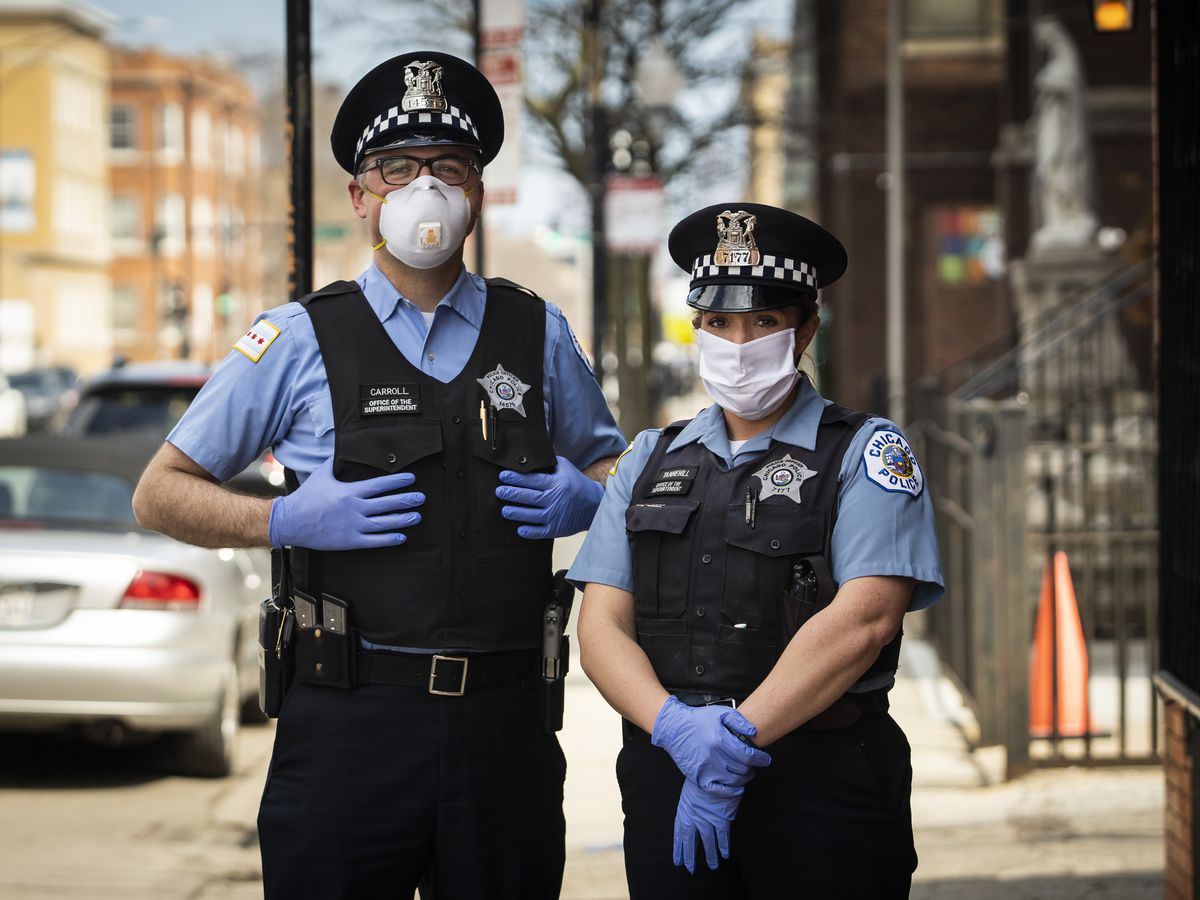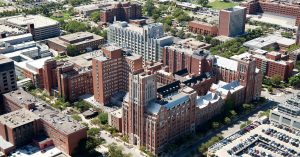The latest
Coronavirus shows Chicago we’re all in this together
Fire officials have been moved by how the public is helping them.
“We’re always looking for more equipment, always looking for N95s,” CFD spokesman Larry Langford said. “In these times, they’re in short supply. We’re always looking for donations. We found a lot of nail salons, construction companies, auto painting shops.”
The Ford Motor Company sent face shields to the department. Koval Distillery in Ravenswood has sent hundreds of gallons of hand sanitizer. A medical equipment company sent cases of gloves.
“We’re getting a lot of help,” said Langford, noting that the fire department, in turn, is prepared to give equipment to hospitals if the need arises. “We’re ready to turn our stuff over to medical facilities if it comes to that. It’s all a chain, and we’re part of it.”
For every big change, there are a thousand small, personal ones.
“People who were standoffish are now coming up,” said Alvin Carter, an Evanston resident who has driven a school bus for 29 years. “I see togetherness the past two months. Ever since this thing came around, we come together.”
Read Neil Steinberg’s full story.
News
7:28 a.m. UIC medical students to graduate early amid COVID-19 pandemic
Nearly 200 medical students at the University of Illinois at Chicago will graduate early Friday to help meet demand for health care workers during the COVID-19 pandemic.
A third of the 192 early graduates have already been matched to residency programs in Illinois, according to a statement from the University of Illinois College of Medicine. They will still have to work directly with their residency programs to determine whether they’ll be able to start work early.
The early graduates represent about two thirds of UIC Medicine’s 2020 graduating class and met all of the college’s graduation requirements, including completing required course and clinical rotation objectives, officials said.
“This is a very dynamic time for these graduates to be entering into the medical profession,” Dr. Robert Barish, vice chancellor for health affairs at UIC, said in the statement.
6:57 a.m. Near North Side retiree sews face masks for other seniors as her part in the ‘pandemic war’
During the 1960s, Jeliner Jordan moved from making shoes to making helmet liners for soldiers in the Vietnam War.
“I remember thinking I had to do a good job and I was dramatic in my mind because I knew our soldiers needed them,” Jordan, 76, said.
With the country now battling coronavirus pandemic, Jordan is again part of a battle. But now, instead of helmet liners, it’s face masks that she’s making for her neighbors at the Chicago Housing Authority’s Zelda Ormes Apartments, a community for seniors.
“We may not be in the Vietnam War any more, but we are at one now, a pandemic war,” she said.
Read more about Jeliner Jordan in Manny Ramos’ story.
5:46 a.m. Parents, advocates urge Pritzker to release inmates as prison coronavirus cases skyrocket
Parents and advocates of people incarcerated for violent crimes in Illinois prisons urged Gov. J.B. Pritzker during a virtual news conference Thursday to release their loved ones as cases of the coronavirus skyrocket.
As of Thursday afternoon, 134 inmates and 86 prison staff have tested positive for the virus. Two inmates have died from COVID-19 so far and two dozen more are hospitalized.
Illinois is one of 16 states that doesn’t allow incarcerated people to earn parole. That means most of the 36,000 people incarcerated in Illinois — 20% of whom are age 50 or older — are at risk of having their criminal sentence turn into a death sentence if they contract the coronavirus inside prison and don’t recover.
“Our calls for release must include everyone, including those who’ve served many years after having been convicted of violent crimes and are ready to return home,” said Alex Ding, an organizer with Parole Illinois, a criminal justice group that hosted Thursday’s news conference.
Reporter Carlos Ballesteros has the full story.
New Cases
Analysis & Commentary
7:31 a.m. As a doctor, how do I tell a black family of five, struck by the virus, to ‘social distance’ in a two-bedroom apartment?
I’m an African-American emergency room physician in Chicago. Recently, a friend called asking about his grandmother who lives on the South Side in a two-bedroom apartment with five family members, one of whom recently was diagnosed as COVID-19 positive.
He asked, “What can I do?”
When I told him to quarantine the infected family member from the grandmother and any other family members with underlying health conditions, my friend reminded me that their apartment has only two bedrooms. He also pointed out that the infected person still has to go to work.
I found myself at a loss for words. And then I started thinking about the larger factors that have now put African-Americans at the epicenter of the corona virus crisis, accounting for 70% of the deaths in a city in which we are just 30 percent of the population. So far, the response from governments at all levels is far short of what is needed.
Read the full letter from Dr. Garth Walker here.
6:12 a.m. Suspend the Freedom of Information Act? Even during a pandemic, that’s a horrible idea
It is never a good idea to restrict the public’s right to information.
Not even — or perhaps, especially — during this pandemic. At a time of crisis, the public depends even more on the media for accurate, timely information.
Many times, that information is obtained via the state’s Freedom of Information Act.
So we were glad to hear Thursday that the Illinois Municipal League and Mayor Lori Lightfoot lost their bid to suspend FOIA deadlines during the time Gov. J.B. Pritzker’s stay-at-home order is in effect.
There’s no reason in the world that government bodies and the media — and others who formally request public information — can’t continue to resolve FOIA disputes informally, as they have always done. It’s a matter for honest dialogue, not anti-democratic rule changes.


















